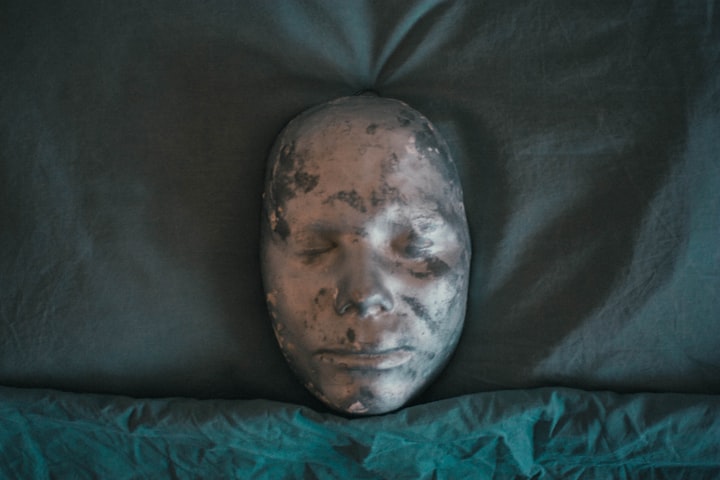To inherit emotion
This world is as real as you can bring yourself to admit it is.

It had been an uneventful Christmas. Years ago, when I was still living with my parents, they told me I was leeching off them and told me to move out. We didn’t really speak after that. The fact that I was an only child in a small family meant that nobody usually contacted me on Christmas.
I couldn’t afford to pay for university and rent at the same time, so the university had to go. I write books now, but I’m nothing special. I’m a hack who rips off the popular stories with the hope of one day striking gold. The only reason people like me exist is because it’ll probably be a few years before we can program computers that are smart enough to rip off what’s popular all on their own. You’d think being published would mean that you’ve made it big, but it’s only just enough to scrape out a living right now.
I’m not proud of it, but this is all I know how to do. Is this what it feels like to be average? I don’t talk to enough people to know. Everything that I’ve ever seen on TV or online seems to tell me that I’m just another one of the herd.
Outside my front door there’s a package wrapped in plastic with my name on it, but I know it’s not a present. Still, it’s heavy enough for me to think it wasn’t advertising of some description. I rip the packaging and find two things; one is a small black notebook, the other is a bundle of cash. The money in my hand weighs just as much as the notebook. I resist the urge the count the money and look inside the notebook instead.
There’s no introduction or instructions; the first line I see reads: 21st January, Kathleen Goldman, $50. The notebook’s full of these; just a date, a name, and an amount of money. I tally up the amount of cash that’s written in the notebook, and it looks to be the same as the amount of money I have, $20,000 or so.
My first thought is to turn it over to the post office, or even the police. The package was too suspicious; what had I ever done to deserve this money? Still, I wasn’t too keen on parting with the money, even if my name on the parcel was a typo. I decide to try to contact the first name on the list, Kathleen Goldman.
I look in a phone directory and find three sets of names that could be Kathleen, but the only the surname is listed; the first name is only an initial. So I call them, one by one. The first two phone numbers aren’t her, and the third number has an automatic message that says the number’s disconnected. I resort to an internet search of her name.
I find a news article about a 47 year old woman called Kathleen Goldman who’d been living alone. She’d died in a house fire at the start of the year. It was on the same date that was in the notebook. The investigators said they thought the fire started in the kitchen, with Kathleen becoming trapped upstairs before collapsing from smoke inhalation.
The article mentions her twenty year old son, whose address I find in the phone directory. I think about just calling him, but part of me wants to meet him face to face and see what kind of person he is. I take the train to his suburb in the early afternoon and walk the rest of the way. It’s one of the richer parts of town.
Kathleen’s son is home when I knock. I explain how the black notebook had just been dumped into my life, but I don’t say anything about the amount of money. I ask him if his mother had known anyone rich or influential, or if she’d had any enemies. He answers no to both. He doesn’t seem to think his mother’s death was anything but an accident.
I ask the son what he does for a living. He simply says he’s a college student. He notices my sceptical glance at the expensive looking two-story house in front of me and tells me that as his mother’s next of kin, he’d received the payouts from both her house insurance and life insurance. He said he’d spent a lot of the money right after his mother had died, but it didn’t help him cut himself off from the pain.
I leave telling him I don’t know why someone left the notebook to me, but that I thought the money listed should go to Kathleen’s next of kin. When I give him the money from my pocket, the look on his face tells me he’s confused as to why we’d talked so much over just fifty dollars, but he doesn’t ask any more questions.
On the way home, I start to wonder if it was right to give the money to someone who seemed like they were so well off. Did Kathleen have other relatives who could’ve used the money more? But then again, maybe her son learned his lesson about being frivolous with money; maybe the money will go towards him making something of himself.
I’m just another nobody; do I have the right to pick and choose who gets the money? But was Kathleen Goldman just some nobody as well? What about her son? What if it’s like the blind leading the blind; people always leave their money to their families, never to charity, never to science. It makes sense to leave your money to someone you know, but if everyone in the world just sees you as a payout way down the road, how well can you really know anyone?
Thinking it over too much leaves a bad taste in my mouth and makes me want to look at the other names in the notebook. The next one is a Richard Moran. I search his name online and there’s a news story about how he hung himself in his own home, only for his wife to find him later. He’d left a note saying he’d been feeling depression for a while and didn’t think anybody in the world could help him.
Perhaps whoever sent the notebook had seen all of these news stories and decided to perform a small act of kindness for each of the families that had gone through it. Maybe that was why they didn’t do it themselves, or why they didn’t leave any instructions; did they want me to decide what was best to do with the money? Will there be a point where I have to decide whether the right answer is to not give it to the family members at all?
The further I get into the notebook, the more money that gets listed for each person. The first thing I find out about the next person is that they’ve been missing since the start of the year. Missing, but not dead. Would whoever sent the notebook want to give a family money if they didn’t know whether their relative was really dead or not? Does whoever sent the notebook know something that everyone else doesn’t? A tense paranoia was creeping into my mind.
I remember that there are dates for each of the names in the notebook. I skip to the very last person in the notebook. The date is New Year’s Eve; tomorrow, and it’s for $5000. It’s the only date in the notebook that comes after the date I received the notebook. It’s for a Helen White. I go into the phone directory again, contact her number, and she’s still alive. I try to convince myself what’s happening isn’t what I think it is. I look at the name in the notebook before Helen White. It’s only for $500. I investigate and sure enough, this person’s dead too.
I call the police immediately. Tell them my name so they know it’s not a prank. I tell them everything I know and that I think Helen White’s life is in danger. They say they’ll send someone over to her and that they’ll be in contact.
About twenty minutes later a police car shows up out the front of my flat with a lone police officer in it. He says he’s here for my protection, says he wants to take me to the safety of the station to do a formal interview. He asks me where the notebook is, and he puts latex gloves on as he puts it, and the rest of the money, into a sealable plastic bag. I sit in the back of the police cruiser when he opens the door for me. There’s a black wiry mesh between me and the front seat. It’s covering the tinted windows as well; makes me feel like I’m in a cage.
The second the officer sits down and closes his door, he pulls a Taser from his side and presses it up against the caging so he can hit me properly. He fires and I catch the sharp wires of the Taser in the chest. I scream my lungs out, but there’s nobody around to help. The pain and twitching lasts for a few seconds, and then I lie still, barely able to move. As I lie there, I try to piece together a way that I’ll make it out of this alive. After all, he didn’t just shoot me, but he probably just didn’t want to make a mess of the car.
The officer doesn’t talk as we drive off. I can’t tell if he thinks I’m just another day at the office or if he actually feels bad for me. After all, police can be followed after work to their homes; homes that can be burned down like Kathleen Goldman’s. Is the officer doing this to make money from my death, or to protect himself? If nobody’s safe from the threat of death, then who can you trust to protect you from it? I wish I’d spoken to somebody about this. I miss my family.
In my last few moments, I can find no meaning in my death; they’ll never find my body. The police control all the evidence. But, if someone’s controlling the police the same way they tried to control me, then what on earth did they need me for?





Comments
There are no comments for this story
Be the first to respond and start the conversation.